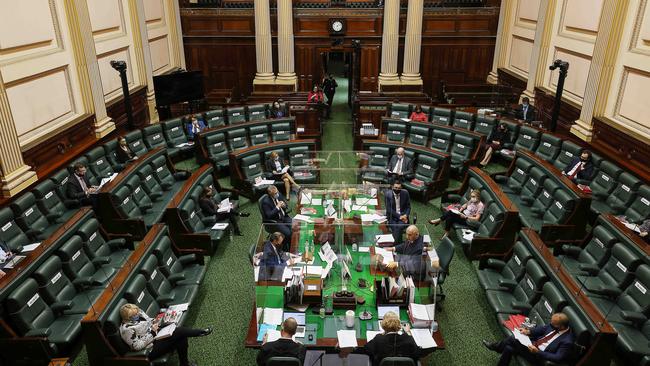Shannon Deery: How long can we keep the vaccinated economy going?
The challenge of how to merge the vaccinated and unvaccinated is a problem the Victorian government will have to grapple with.
Opinion
Don't miss out on the headlines from Opinion. Followed categories will be added to My News.
FIVE Victorian MPs will be barred from attending parliament when it sits this week.
In the upper house both Liberal Democrats, Tim Quilty and David Limbrick, independent Catherine Cumming and Adem Somyurek will not attend because they refuse to show proof of their vaccination status.
In the lower house only Liberal MP Neil Angus, who has vehemently opposed mandatory vaccination, will be refused entry.
The ban will remain in place until they agree to provide their medical details or until the second parliament sitting day of the new year.
It is somewhat of an anomaly that progressive Victoria is the first Australian state to force all MPs to be vaccinated against Covid-19 or be barred from parliament.
MPs are booted out of parliament all the time for rowdy behaviour: suspended for perhaps an hour, maybe a day.

But it’s been some time since a Victorian MP was shown the door for any real period of time.
Sweeping powers still exist to punish MPs, but they’re rarely used.
In a hangover from the 19th century, members can be locked up, reprimanded, suspended or expelled.
You have to go back to 1901, when Labor MP Edward Findley was expelled from parliament over an article he published about King Edward VII.
After being kicked out of parliament he went on to win a seat in the Australian Senate two years later.
In 2014 there was a push to expel rogue MP Geoff Shaw for misusing his parliamentary entitlements, but it failed to win enough support.
The suspension of five MPs for the remainder of the year counts among the most drastic interventions in Victoria’s democracy in recent memory.
Between them they represent tens of thousands of Victorians, who have now lost their representative voice.
Charles Sturt University law lecturer Dr Bede Harris has argued there could be a legal basis on which to challenge the suspensions, based on the implied freedom of political communication.
“The question is, does it limit the implied freedom of political communication?” he told the ABC last week.
“Well, it certainly does in relation to an MP who is suspended because they refuse to be vaccinated.
“And it does that because it is of the essence of representative government that people are represented by their MPs in the parliament, and their MPs can express their views on behalf of their constituents.”
Mr Limbrick, who is vaccinated, refuses to disclose his proof of vaccination on privacy grounds.
He wanted a compromise that would have allowed MPs to come to work by doing a PCR or rapid antigen test, and argued it would have been safer.
“By having regular testing, parliamentarians and staff will be safer than if they provide their private vaccine information,” he told parliament.
“Every day for months we have heard how effective the vaccines are at preventing serious illness from Covid-19.
“Vaccinated people should have little to worry about.”
As vaccinated populations go, as a microcosm of society, the Victorian parliament is among the most vaccinated in the world.
With at least 124 of 128 MPs vaccinated, that’s 97 per cent.
The challenge of how to merge the vaccinated and unvaccinated is a problem the Victorian government will have to grapple with.
Across our emergency services we have failed to reach 100 per cent vaccination rates, which means fewer feet on the ground working in the already resource-starved organisations.
Hundreds of workers across the state have been stood down from hospitals, the last place we can afford to not have running at full capacity.
At schools and universities, across key sectors, and on the sports field and stage there is going to be some vaccine hesitancy.
One business owner I spoke to last week has a pathological fear of injections stemming from childhood.
This person has seen a psychiatrist in order to overcome the problem. But it means that their business of 35 years will not be allowed to open.
Some projections suggest Victoria could hit 90 per cent fully vaccinated by early November, but certainly by December.
How long can we keep the vaccinated economy going? For now, we’ve been told, well into next year.
It makes no sense to rush, and the move should only be made when there is confidence that our health system can handle it.
The speed at which NSW has opened up has forced Victoria’s hand over the past fortnight.
In NSW, unvaccinated people will enjoy the same restrictions as the vaccinated from December 1 when the state is expected to hit its 90 per cent target.
Perhaps Victoria will once again follow suit.
SHANNON DEERY IS HERALD SUN STATE POLITICS EDITOR



